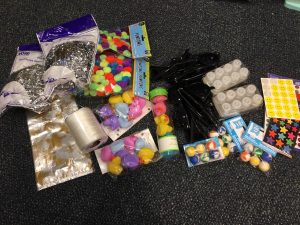Gift baskets and one-on-one conversations

Image description: clusters of sunglasses, brightly colored stickers, bubbles, bouncy balls, and rubber duckies arranged in groups on the floor.
Duke Disability Alliance (DDA) created a multifaceted survey this Spring for the Duke population regarding accessibility on campus. The goal? To obtain data to create a happier, healthier, equalizing campus. In one of nineteen items, respondents were asked how they would characterize the culture of the Duke community, and how this culture impacted their wellbeing. Here is a sampling of what 137 of your peers had to say:
The responses ranged from admittedly unsurprising:
“There is a lot of perceived pressure on this campus.”
“[we] work hard in a way that perpetuates feelings of stress.”
“Very high expectations for academic and social behavior.”
To troublesome:
“Duke is not conducive to positive and healthy wellbeing.”
“The competitive nature of Duke often obscures students from understanding or empathizing with the troubles and limitations placed on others.”
“The campus culture is superficial. Everyone tries to act like they are ok.”
“So many students are so high achieving. This has caused me a lot of stress and has lowered my self-esteem.”
“It’s competitive. It makes me feel like a failure and decreases my willingness to try.”
“It is disastrous to my mental health.”
“I wish there was more emphasis on studying to become the best people. People do not have high enough standards for themselves.”
And yet, we remain hopeful:
“Despite competitive academics, Duke has a very accepting student body. I feel a strong sense of community here, one that I could rely on.”
“I would say it is stressful…[but] there are many great aspects to Duke and many great people.”
“Competitive, but also a lot of caring people.”
“It’s stressful—but vibrant.”

Project Goal:
People have good days and bad days. I cannot change your Duke experience, or how you feel about the community that surrounds you. I can help you have a good day. Today, I hope to help you smile and remind you of the positivity in the world. Each day is a choice—a choice to have a good day or a bad day, to let yourself be brought down or uplifted. The more we acknowledge and understand mental health differences, the better we can support each other. My goal is to remind you of your self-worth and your support networks. I encourage you to keep finding joy in small things, and to prioritize taking care of yourself. Enjoy these little gifts and “treat yo self”—or better yet, pass them along to a friend who needs a little laugh.
Counseling and Psychological Services (CAPS): https://studentaffairs.duke.edu/caps
DukeReach: 919-681-2455
Women’s Center: 919-684-3897




